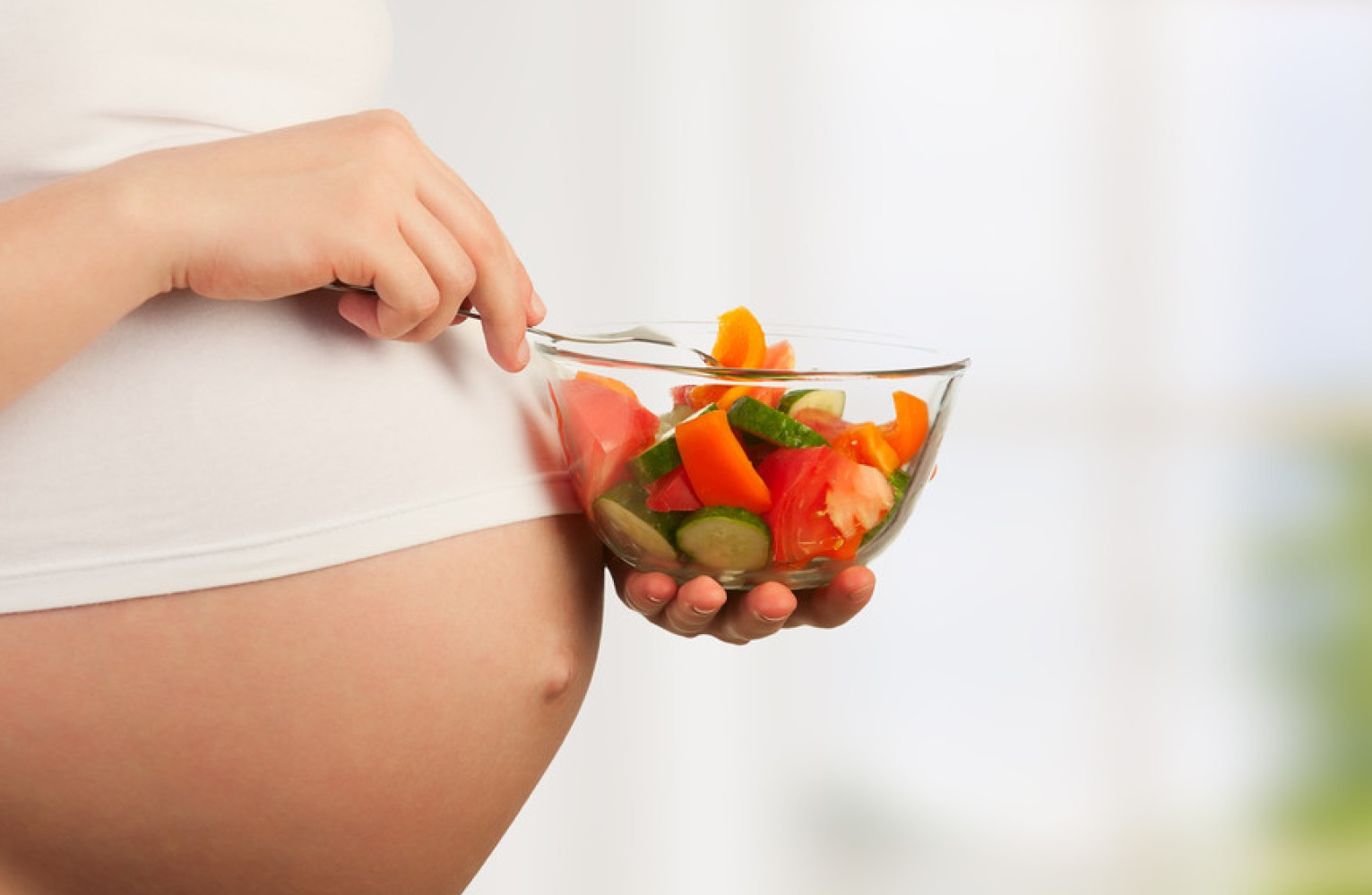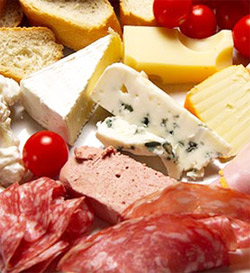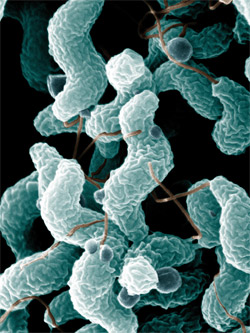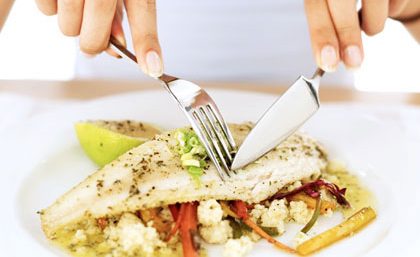Because certain food can cause health problems that may affect a developing embryo – particularly during those vital early weeks of pregnancy – you should always take care to avoid food-borne infections in your preconception period as you prepare for pregnancy. Two of the more dangerous infections that are known to have adverse effects on your baby during pregnancy are listeriosis, and toxoplasmosis. These can both be caught from food and animals but, with care, can be avoided.

Doctors will advise pregnant women to stay away from,fish like tuna, shark and king mackerel as they are likely to contain high levels of mercury and are never a good idea in high doses. Raw meat is another definite no-no, so steak tartar and carpaccio is out for the duration. E coli is known to lurk in undercooked hamburger meat, so that’s another food you might want to stay away from. Furthermore, experts say foods containing raw eggs can put you at risk for salmonella and that, sadly, some soft cheeses, especially moldy and unpasteurized ones are out of bounds.
Toxoplasmosis
This is caused by a parasite called Toxoplasma gondii. It is carried by many animals, found in the feces of cats, and is also found in row meat and unpasteurized milk. Toxoplasmosis is a common infection, but once you have had it you usually become immune to it (about 30 percent of adults are immune). A simple blood test before pregnancy will let you know if you carry the antibodies that will protect you and your baby from toxoplasmosis.
It’s important to avoid this infection while you are planning to conceive and when pregnant because treatment with antibiotics is difficult and the infection can lead to blindness and brain damage in your baby. If you know you have the antibodies, you should be safe from infection. However, it’s best to take preventative measures. You should always wash your hands each time you handle a cat or kitten. If possible, avoid touching cat litter or use gloves and wash your hands afterward. Always empty litter trays within 24 hours as the parasite is not active before this time. Be sure to always wash vegetables carefully (especially those to be eaten raw), avoid drinking or cooking with unpasteurized milk, and cook raw meat thoroughly.
Listeriosis
 This is caused by the bacteria Listeria monocytogenes. It can be found in soil and water, and is carried by some animals, such as pregnant or lambing sheep. Also found in many foods such as soft cheeses and pates, it is an unusual bacteria because it can multiply in the low temperatures found in your fridge. Heating foods to at least 160oF(70oC) for more than two minutes will kill the bacteria.
This is caused by the bacteria Listeria monocytogenes. It can be found in soil and water, and is carried by some animals, such as pregnant or lambing sheep. Also found in many foods such as soft cheeses and pates, it is an unusual bacteria because it can multiply in the low temperatures found in your fridge. Heating foods to at least 160oF(70oC) for more than two minutes will kill the bacteria.
Foods typically associated with listeriosis have a long shelf life and are eaten without further cooking. Outbreaks have involved foods such as coleslaw, Mexican-style soft cheeses, milk, pâté, pork tongue, hot dogs, processed meats and deli salads. Examples of foods that may harbor this pathogen include unpasteurized milk, raw milk products, raw and smoked seafood, and any ready-to-eat processed foods, such as hot dogs, luncheon meats or deli meats, that have not been heated to proper temperatures before serving.
A bout of listeriosis is usually very mild, rather like having the flu, and it can be treated with antibiotics. But if you are infected during pregnancy, the bacteria can cross the placenta and seriously affect your baby, even possibly causing miscarriage or stillbirth. Even though the bacteria is found widely in food, it doesn’t often cause problems in pregnancy and is less common than toxoplasmosis. Despite its rarity, you should try to avoid it, especially around the time of conception and pregnancy.
To reduce the risk of listeriosis, cut out soft cheeses like Brie or Camembert and blue-veined varieties. Avoid pate, which is often a carrier of the infection. You should also be very careful when eating ready-made “cook/chill” meals, reheating them thoroughly for at least two minutes so that they are steaming hot.
Salmonellosis
Salmonellosis is a common form of food infection that may result when foods containing Salmonella bacteria are eaten. The bacteria are spread through direct or indirect contact with the intestinal contents or waste of animals, including humans. Salmonella bacteria do not grow at refrigerator or freezer temperatures and are easily destroyed by heating foods to 165 degrees F.
Symptoms of salmonellosis include headache, diarrhea, abdominal pain, nausea, chills, fever and vomiting; these usually appear within 12 to 36 hours after eating the contaminated food. Foods most often involved include raw (unpasteurized) milk and raw milk products, raw or undercooked meat and poultry, raw or undercooked eggs, raw sprouts (alfalfa, clover, radish, broccoli), salads (including chicken, tuna, potato), and cream desserts and fillings.
To avoid infection from Salmonella bacteria, pregnant women should follow general safe food handling practices, including washing hands often with hot, soapy water, especially after using the bathroom and before and after handling food. Hands and working surfaces should be thoroughly washed after contact with raw meat, fish, poultry, and foods that will not undergo further cooking. Fresh fruits and vegetables should be rinsed well before eating, and food such as raw milk and raw milk products, raw or undercooked eggs, raw sprouts, raw or undercooked meat and poultry, and unpasteurized fruit juices should be avoided.
Pregnant women are not at an increased risk for getting salmonellosis; however, one type of Salmonella bacteria, called Salmonella typhi may be passed to the fetus.
Campylobacteriosis
 Consuming food or water that contains the bacteria Campylobacter jejuni causes an infection called campylobacteriosis. C. jejuni is found in the intestinal tracts of animals (especially chickens) and in untreated water. This organism thrives in a reduced oxygen environment and is inhibited by acid, salt and drying. C. jejuni also is easily destroyed by heat (120 degrees F).
Consuming food or water that contains the bacteria Campylobacter jejuni causes an infection called campylobacteriosis. C. jejuni is found in the intestinal tracts of animals (especially chickens) and in untreated water. This organism thrives in a reduced oxygen environment and is inhibited by acid, salt and drying. C. jejuni also is easily destroyed by heat (120 degrees F).
Although pregnant women are not at an increased risk of campylobacteriosis, infection from this bacteria can result in transmission to the placenta. Consequences of fetal infection include abortion, stillbirth or preterm delivery. Symptoms usually appear within 2 to 5 days after eating the contaminated food and include fever, stomach cramps, muscle pain, diarrhea, nausea and vomiting. Infection from C. jejuni may be treated with antibiotics.
C. jejuni is most often found in raw (unpasteurized) milk and raw milk products, raw or undercooked meat and poultry, and raw shellfish. To avoid campylobacteriosis, pregnant women are advised to consume only pasteurized milk and milk products and to thoroughly cook meat, poultry and shellfish. Hands, surfaces, cutting boards and utensils that come in contact with raw meat, poultry or fish should be washed well with hot, soapy water.
Guidelines to prevent food-borne infections:
To avoid listeriosis, toxoplasmosis, and other food-borne infections, follow these simple guidelines:
- Use a food thermometer to make sure meat, poultry (including ground meats) and eggs are cooked to safe endpoint temperatures. Use a thermometer to make sure leftovers are reheated to 165 degrees F.
- Cut out liver, pate, soft cheeses, foods made with raw egg and raw or undercooked meat from your diet.
- Always keep your hands, utensils, and work surfaces clean when preparing food.
- Use a separate chopping board for preparing raw meat. Scrub the board vigorously with soap and hot water after each use.
- Cook raw foods thoroughly – especially meat, eggs, shellfish, and legumes.
- Keep the temperature of your refrigerator below 32oF (4oC) and store raw meat on the bottom shelf to prevent juices dripping onto other foodstuffs. All foods in the fridge should also be covered.
- Use an insulated container to transport frozen foods from the store to your home.
- Always buy and eat food before the “sell by” and “use by” dates listed on the packaging.
- Always follow manufacturers’ instructions when defrosting and reheating precooked foods.
- Make sure food is reheated to steaming hot for at least two minutes, and throw away any leftover reheated food.
- Do not refreeze defrosted food.
- Wash your hands after handling animals.
- Wash pet utensils separately from your own utensils.
Avoid Foods from Unsafe Sources
Use the following guide to help choose safe foods during pregnancy, while avoiding foods from unsafe sources.
| Instead of… | Choose |
| Cold hot dogs, deli meats and luncheon meats | Hot dogs, luncheon meats and deli meats reheated to steaming hot |
| Undercooked meat and poultry | Fully cooked meat and poultry |
| Raw or undercooked seafood | Fully cooked seafood |
| Refrigerated smoked fish and precooked seafood such as shrimp, crab and deli seafood salads | Tuna, salmon and crab meat in cans or pouches |
| Refrigerated pâtés and meat spreads | Canned pates and meat spreads |
| Raw sprouts | Fresh vegetables (well-cleaned) and cooked sprouts |
| Soft cheeses made from raw milk such as Feta, Brie, Camembert, blue-veined cheeses, queso fresco, queso blanco and Panela | Hard cheeses, processed cheeses, cream cheese, cottage cheese, mozzarella, and soft cheeses made from pasteurized milk |
| Raw or undercooked eggs | Eggs that are cooked until the white and yolk are firm |
| Raw milk and milk products | Pasteurized milk and milk products |
| Unpasteurized juice (May be called “fresh squeezed” or “chilled”) |
Frozen concentrate, canned juices and refrigerated juices that are labeled as pasteurized |
Disclaimer
The Content is not intended to be a substitute for professional medical advice, diagnosis, or treatment. Always seek the advice of your physician or other qualified health provider with any questions you may have regarding a medical condition.



